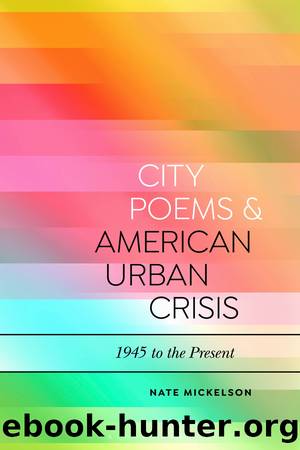City Poems and American Urban Crisis by Mickelson Nate;

Author:Mickelson, Nate;
Language: eng
Format: epub
Publisher: Bloomsbury Publishing Plc
Published: 2019-06-15T00:00:00+00:00
Words lose meaning as they circulate through the urban environment, and this contributes to a growing madness in the city itself. Oppen describes an unidentified speaker who âwants to say / His life is realâ but fails in his efforts to communicate the value of his experience. The best he can muster is a nihilistic joke: âThere is nobody here but us chickens.â As Nicholls observes, the âurban landscape [of âOf Being Numerousâ] registers a disturbing loss of historical and linguistic depthâ (84). Indeed, as Oppenâs revision of section 4 of âA Language of New Yorkâ suggests, by the time he composed the expanded poem he was beginning to lose faith in the possibility that poetic language provides a means for intervening in the circumstances of urban crisis.
His pessimism is perhaps most evident in section 26 of âOf Being Numerous,â the longest section in the series and one that does not appear in any form in âA Language of New York.â Seeking a purpose for poetry in view of catastrophic world events, Oppen compares American cities in the 1960s to the European cities he encountered during the Second World War, a strategy he also uses in âRoute.â He describes what it feels like to be a poet in an atmosphere of crisis and concludes that âWe stand on // That denial of death that paved the cities, / Paved the cities // Generation / For generationâ (NCP 178). Urban experience is thoroughly alienating, according to this view, because it is founded on a refusal to accept human mortality. The âdenial of deathâ Oppen witnesses in these lines shows that cities cannot provide assurance, in and of themselves, that humanity will be protected from harm. In fact, as the poem suggests, cities are merely places where lives are âpavedâ over generation after generation in fruitless ideological attempts to forestall the inevitable. The remainder of âOf Being Numerousâ tests the extent to which poetic engagement with the city is doomed to replicate this perverse and debilitating cycle.
For Marjorie Perloff, the meditation on poetics in sections 26 and 27 represent the climax of the poem. Noting that the first line of section 27, âIt is difficult now to speak of poetryâ,â signals a shift in Oppenâs perspective on the limitations of language, she suggests that Oppenâs pessimism about the distortions and madness of the city is balanced by his commitment to addressing the material effects of urban crisis through poetic inquiry. In Perloffâs reading, Oppenâs renews his inquiry in section 27 by outlining a process that connects personal experiences to broader social and political dynamics. It begins in his description of poetry as a form of autobiography, âOne would have to tell what happens in a life, what choices present themselves, what the world is for us,â and continues in terms that echo Heideggerâs dwelling: âI would want to talk of rooms and of what they look out on and of basements, the rough walls bearing the marks of the forms, the old marks of wood in the concrete, such solitude as we knowâ (NCP 180).
Download
This site does not store any files on its server. We only index and link to content provided by other sites. Please contact the content providers to delete copyright contents if any and email us, we'll remove relevant links or contents immediately.
The Power of Myth by Joseph Campbell & Bill Moyers(925)
Half Moon Bay by Jonathan Kellerman & Jesse Kellerman(911)
A Social History of the Media by Peter Burke & Peter Burke(880)
Inseparable by Emma Donoghue(844)
The Nets of Modernism: Henry James, Virginia Woolf, James Joyce, and Sigmund Freud by Maud Ellmann(739)
The Spike by Mark Humphries;(719)
A Theory of Narrative Drawing by Simon Grennan(706)
The Complete Correspondence 1928-1940 by Theodor W. Adorno & Walter Benjamin(704)
Ideology by Eagleton Terry;(659)
Bodies from the Library 3 by Tony Medawar(649)
Culture by Terry Eagleton(646)
World Philology by(645)
Farnsworth's Classical English Rhetoric by Ward Farnsworth(641)
A Reader’s Companion to J. D. Salinger’s The Catcher in the Rye by Peter Beidler(614)
Adam Smith by Jonathan Conlin(607)
High Albania by M. Edith Durham(592)
Game of Thrones and Philosophy by William Irwin(592)
Comic Genius: Portraits of Funny People by(581)
Monkey King by Wu Cheng'en(575)
